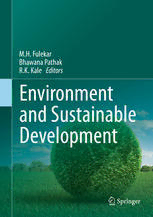Table Of ContentM.H. Fulekar
Bhawana Pathak
R.K. Kale Editors
Environment
and Sustainable
Development
Environment and Sustainable
Development
M.H. Fulekar • Bhawana Pathak (cid:129) R.K. Kale
Editors
Environment
and Sustainable
Development
123
Editors
M.H.Fulekar BhawanaPathak
SchoolofEnvironment SchoolofEnvironment
andSustainableDevelopment andSustainableDevelopment
CentralUniversityofGujarat CentralUniversityofGujarat
Gandhinagar,Gujarat Gandhinagar,Gujarat
India India
R.K.Kale
SchoolofLifeSciences
JawaharLalNehruUniversity
NewDelhiandViceChancellor
CentralUniversityofGujarat
Gandhinagar,Gujarat
India
ISBN978-81-322-1165-5 ISBN978-81-322-1166-2(eBook)
DOI10.1007/978-81-322-1166-2
SpringerNewDelhiHeidelbergNewYorkDordrechtLondon
LibraryofCongressControlNumber:2013943261
©SpringerIndia2014
Thisworkissubjecttocopyright.AllrightsarereservedbythePublisher,whetherthewhole
orpart ofthematerial is concerned, specifically the rights oftranslation, reprinting, reuse of
illustrations,recitation,broadcasting,reproductiononmicrofilmsorinanyotherphysicalway,
andtransmissionorinformationstorageandretrieval,electronicadaptation,computersoftware,
orbysimilarordissimilarmethodologynowknownorhereafterdeveloped.Exemptedfromthis
legalreservationarebriefexcerptsinconnectionwithreviewsorscholarlyanalysisormaterial
suppliedspecificallyforthepurposeofbeingenteredandexecutedonacomputersystem,for
exclusive usebythepurchaserofthework.Duplication ofthispublication orpartsthereofis
permitted only under the provisions of the Copyright Law of the Publisher’s location, in its
currentversion,andpermissionforusemustalwaysbeobtainedfromSpringer.Permissionsfor
usemaybeobtainedthroughRightsLinkattheCopyrightClearanceCenter.Violationsareliable
toprosecutionundertherespectiveCopyrightLaw.
Theuseofgeneraldescriptivenames,registerednames,trademarks,servicemarks,etc.inthis
publication does not imply, even in the absence of a specific statement, that such names are
exempt from the relevant protective laws and regulations and therefore free for general use.
While the advice and information in this book are believed to be true and accurate at the
dateofpublication, neither theauthors northeeditors northepublisher canaccept anylegal
responsibilityforanyerrorsoromissionsthatmaybemade.Thepublishermakesnowarranty,
expressorimplied,withrespecttothematerialcontainedherein.
Printedonacid-freepaper
SpringerispartofSpringerScience+BusinessMedia(www.springer.com)
About the Book
Global society in the 21st century is facing challenges of improving the
qualityofair,water,soilandtheenvironmentandmaintainingtheecological
balance.Environmentalpollution,thus,hasbecomeamajorglobalconcern.
The modern growth of industrialization, urbanization, modern agricultural
development and energy generation has resulted in the indiscriminate ex-
ploitationofnaturalresourcesforfulfillinghumandesiresandneeds,which
hascontributedin disturbingthe ecologicalbalanceonwhichthe qualityof
ourenvironmentdepends.
Human beings, in the truest sense, are the product of their environment.
The man-environmentrelationshipindicatesthatpollutionanddeterioration
of the environment have a social origin. The modern technological ad-
vancementsin chemical processes/operationshave generated new products,
resulting in new pollutants in such abundant levels that they are above the
self-cleaningcapacityoftheenvironment.Oneofthemajorissuesin recent
times is the threat to human lives due to the progressive deterioration of
the environment from various sources. The impact of the pollutants on the
environment will be significant when the accumulated pollutants load will
exceedthecarryingcapacityofthereceivingenvironment.
Sustainable developmentenvisages the use of natural resources, such as
forests, land, water and fisheries, in a sustainable manner without causing
changes in our natural world. The Rio de Janeiro-Earth Summit, held in
Brazil in 1992, focused on sustainable development to encourage respect
andconcernfor theuse of naturalresourcesin a sustainable mannerforthe
protectionoftheenvironment.
This book will be beneficial as a source of educational material to post-
graduateresearchscholars,teachersandindustrialpersonnelformaintaining
thebalanceintheuseofnaturalsourcesforsustainabledevelopment.
v
About the Editors
Dr. M.H. Fulekar is Professor and Dean at
the School of Environment and Sustainable
Development, Central University of Gujarat.
He was also Professor and Head, University
Department of Life Sciences, University of
Mumbai. He has in his credit more than 150
researchpapersandarticlespublishedinnational
and international journals of repute. He is also
authorof10books.HehassupervisedninePh.D.
students. He has done extensive research in the
area of Environmental Sciences under the fol-
lowing research projects: UGC, CSIR, BRNS,
DBT(R&D)andindustrialconsultancyprojects.
Dr. Bhawana Pathak is Assistant Professor at
the School of Environmentand Sustainable De-
velopment,CentralUniversityofGujarat.Earlier
she has worked as a Pool Officer in the De-
partment of Life Sciences, University of Mum-
bai. She has done research in the area of Plant
Ecology and Biodiversity Conservation from
G. B. Pant Institute of Himalayan Environment
and Development, Kosi Katarmal Almora, Ut-
taranchal. She was awarded gold medal in her
postgraduatestudies. HerresearchinterestsincludeEnvironmentalBiotech-
nologyandBiodiversity.
vii
viii AbouttheEditors
Professor R.K. Kale has been teaching
at the School of Life Sciences, Jawahar-
lal Nehru University (JNU), New Delhi.
He has published more than 120 research
papers in national and international scien-
tific journals.He supervisedresearchwork
of 29 students leading to award of Ph.D.
and also 6 students for M.Phil degree. His
researchareasincludecancerandradiation
biology. He has also greatly contributed
to the area of higher education and so-
ciety. He was awarded ICMR Prize for
Biomedical Research – 1996, for his orig-
inal contribution to radiation biology. He
has extensive experience in University Administration and Planning; and
served the JNU in various capacities including Dean of the School of
Life Sciences. Presently, he is Vice-Chancellorof the Central University of
Gujarat,Gandhinagar,India.
Contents
1 Emergence of GreenTechnologies Towards Sustainable
Growth................................................. 1
TapanChakrabarti
2 SustainableDevelopment:AnEarnestHope ................ 23
SangeetaSingh
3 Soil Seed Bank Dynamics: History and Ecological
SignificanceinSustainabilityofDifferentEcosystems........ 31
UpamaMallandGopalS.Singh
4 ChallengesandProspectsinExploringMarineMicrobial
Diversity................................................ 47
K.B.AkondiandV.V.Lakshmi
5 BioprospectingofPlantEssentialOilsforMedicinalUses .... 59
JayantShankarRautandSankunnyMohanKaruppayil
6 AirPollutionScenariooverDelhiCity ..................... 77
SiddharthaSinghandS.K.Peshin
7 Nanotechnology:PerspectiveforEnvironmental
Sustainability ........................................... 87
M.H.Fulekar,BhawanaPathak,andR.K.Kale
8 An Overview of Environmental Remediation Using
Photocatalyst............................................ 115
DimpleP.Dutta
9 RoleofBiopolymersinIndustries:TheirProspectiveFuture
Applications ............................................ 133
RiaRautelaandSwaranjitSinghCameotra
10 GreenFederalism:A HistoricLeapTowardsSustainable
HumanDevelopment..................................... 143
IndiraDuttaandJiyaShahani
11 EconomicSustainabilityinLightofConsumerBehaviour:
GandhianPerspectives ................................... 159
NimishaShuklaandSudarshanIyengar
ix

